Unit 1 Where did you go on vacation SectionA Grammar Focus 课件(26张PPT)
文档属性
| 名称 | Unit 1 Where did you go on vacation SectionA Grammar Focus 课件(26张PPT) | 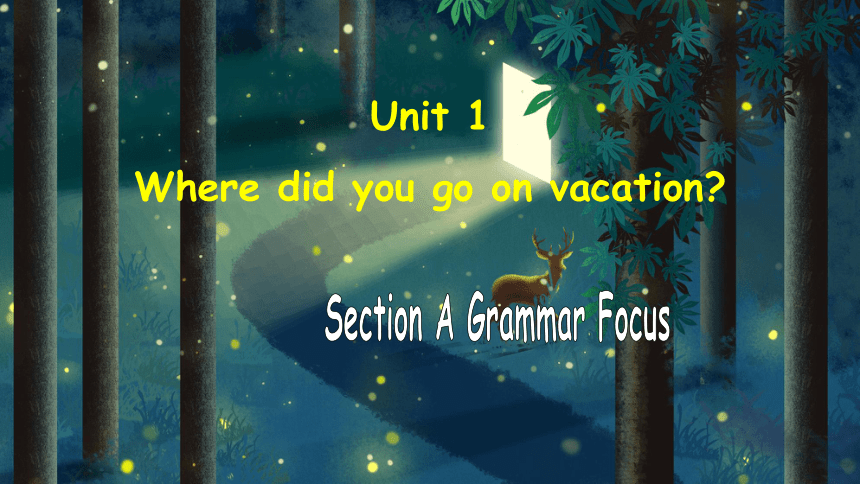 | |
| 格式 | pptx | ||
| 文件大小 | 2.5MB | ||
| 资源类型 | 教案 | ||
| 版本资源 | 人教新目标(Go for it)版 | ||
| 科目 | 英语 | ||
| 更新时间 | 2021-07-31 14:44:10 | ||
图片预览


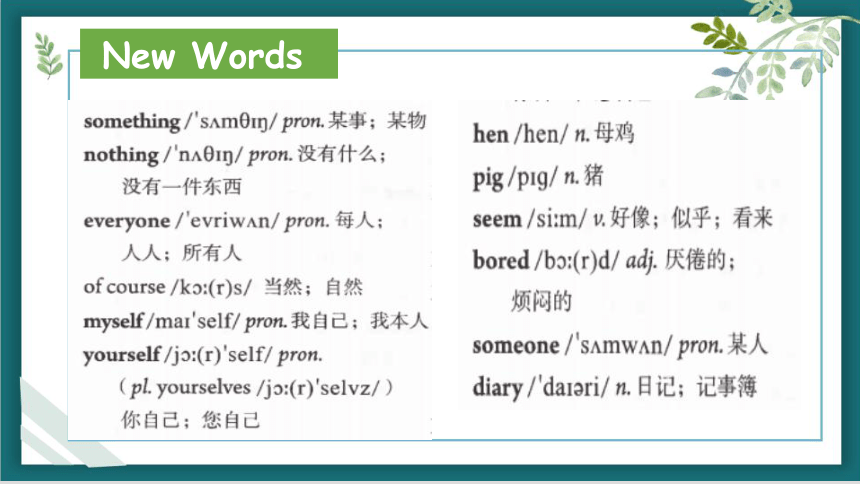
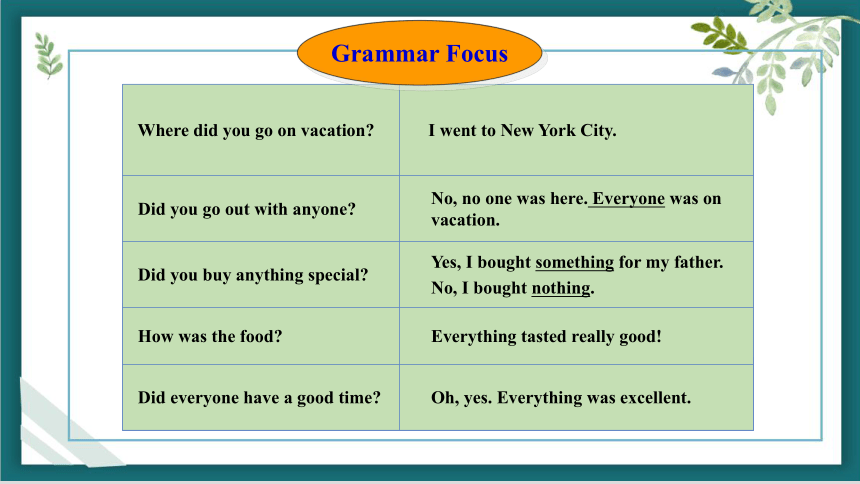
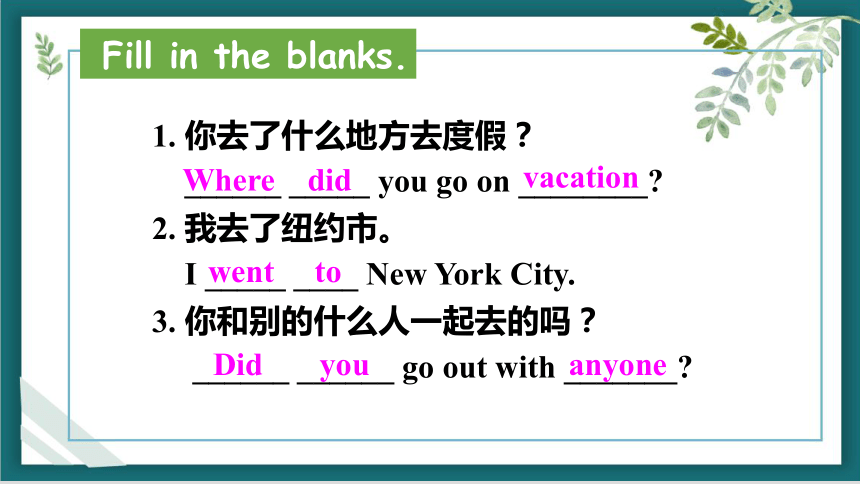
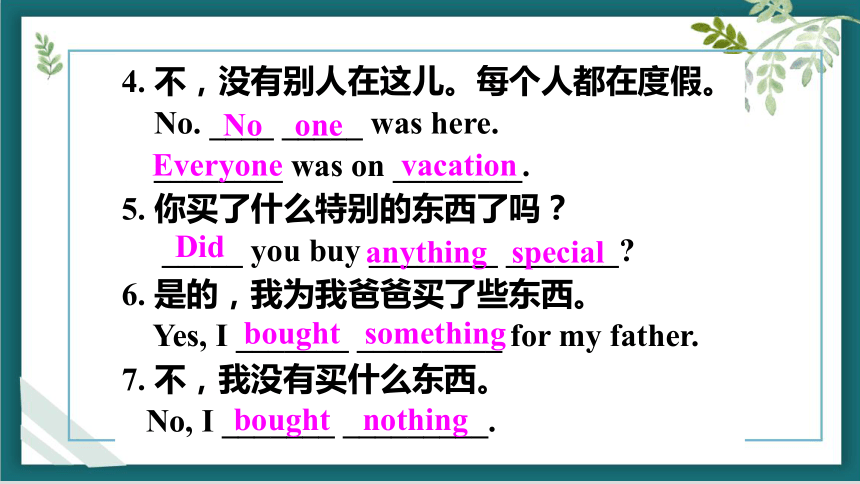
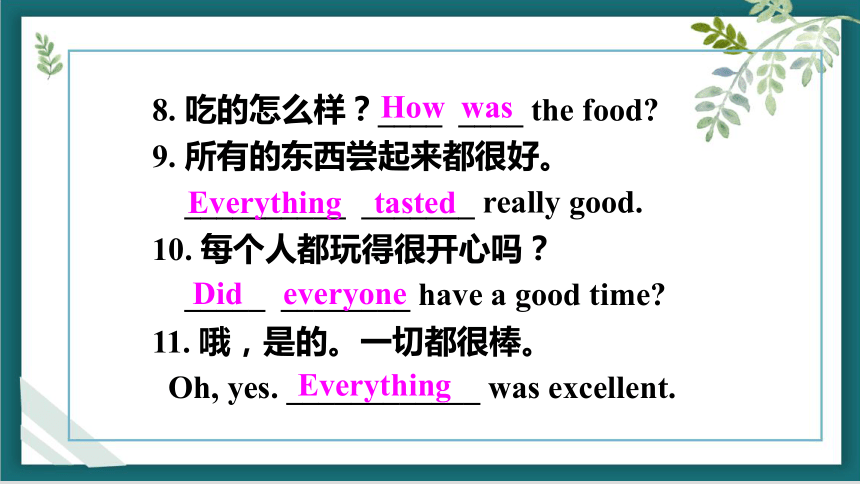
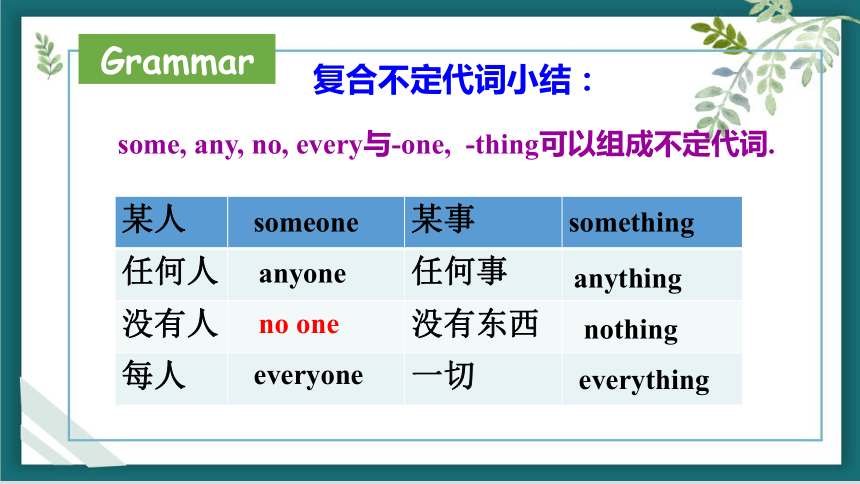
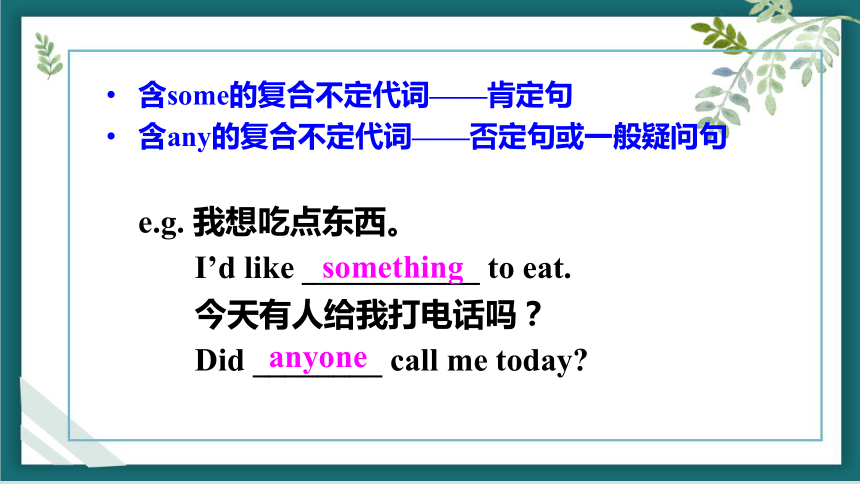
文档简介
(共26张PPT)
Unit 1
Where did you go on vacation
Section A Grammar Focus
New Words
Where did you go on vacation I went to New York City.
Did you go out with anyone No, no one was here. Everyone was on vacation.
Did you buy anything special Yes, I bought something for my father.
No, I bought nothing.
How was the food Everything tasted really good!
Did everyone have a good time Oh, yes. Everything was excellent.
Grammar Focus
1. 你去了什么地方去度假?
______ _____ you go on ________
2. 我去了纽约市。
I _____ ____ New York City.
3. 你和别的什么人一起去的吗?
______ ______ go out with _______
vacation
Where did
went to
Did you
anyone
Fill in the blanks.
4. 不,没有别人在这儿。每个人都在度假。
No. ____ _____ was here.
________ was on ________.
5. 你买了什么特别的东西了吗?
_____ you buy ________ _______
6. 是的,我为我爸爸买了些东西。
Yes, I _______ _________ for my father.
7. 不,我没有买什么东西。
No, I _______ _________.
No one
Everyone
vacation
anything special
Did
bought something
bought nothing
8. 吃的怎么样?____ ____ the food
9. 所有的东西尝起来都很好。
__________ _______ really good.
10. 每个人都玩得很开心吗?
_____ ________ have a good time
11. 哦,是的。一切都很棒。
Oh, yes. ____________ was excellent.
How was
Everything tasted
Did everyone
Everything
某人 某事
任何人 任何事
没有人 没有东西
每人 一切
some, any, no, every与-one, -thing可以组成不定代词.
someone
复合不定代词小结:
anyone
no one
everyone
something
anything
nothing
everything
Grammar
含some的复合不定代词——肯定句
含any的复合不定代词——否定句或一般疑问句
e.g. 我想吃点东西。
I’d like ___________ to eat.
今天有人给我打电话吗?
Did ________ call me today
anyone
something
3. 不定代词时+形容词
e.g. 这本书里有什么新东西吗?
Is there _________ _____ in this
book
今天没有什么特别的事。
There’s _________ _______ today.
anything new
nothing special
4. 由some, any, no, every构成的复合不定
代词作主语,看作单数,其谓
语动词用单数第三人称形式。
e.g. Something ____ (be) wrong with my watch.
Well, everyone _____ (want) to win.
There ____ (be) something for everyone at
Greenwood Park.
is
wants
is
Linda: Did you do________ fun on your vacation, Alice
Alice: Yes, I did. I went to Sanya.
Linda: How did you like it
Alice: Well, it was my first time there, so_____________
was really interesting.
3a. Fill in the blanks with the words in the box and practice the conversation.
anyone something anything everything nothing
anything
everything
Linda: Did you go with__________
Alice: Yes, I did. I went with my sister.
Linda: Did you go shopping
Alice: Of course! I bought__________ for my
parents, but _________for myself.
Linda: Why didn’t you buy__________ for yourself
Alice: I didn’t really see ____________I liked.
anyone
something
nothing
anything
anything
anyone something anything everything nothing
Dear Bill,
How was your vacation Did you do ________ interesting Did________ in the family go with you I went to a friend’s farm in the countryside with my family. _________was great.
anything everything nothing everyone no one
3b Fill in the blanks in the e-mail message
with the words in the box.
anything
everyone
everything
We fed some hens and saw some baby
pigs. They were so cute! The only
problem was that there was __________ much to do in the evening but read. Still __________ seemed to be bored. Bye for now!
Mark
nothing
nothing
anything everything nothing everyone no one
3c. Ask your group questions about their last
vacation. Then tell the class your results.
Did you… Everyone Someone No one
eating anything at a restaurant
read anything interesting
Visit anyone in your family
Buy anything
Keep a diary
In our group, everyone ate something at a restaurant
一般过去时
The simple past tense
肯定句:主语+was (were) +宾语
如:I was late yesterday.
昨天我迟到了。
否定句:主语+was (were) +not+宾语
如:We weren't late yesterday.
我们昨天没迟到
Be 动词的一般过去时态构成:
疑问句:Was (Were) +主语+宾语
如: Were you ill yesterday
你昨天病了吗?
肯定回答: Yes, I was. 是的,我病了。
否定句: No, I wasn't. 不,我没病。
特殊疑问句: 特殊疑问词+was (were) +主语
+宾语 如:
When were you born
你是什么时候出生的?
肯定句要使用动词的过去式,否定句和疑问句要使用助动词do和 does 的过去式 did.
肯定句为:主语+动词过去式+宾语
如:I went home at nine o'clock yesterday.
我昨天九点钟回的家。
否定句:主语+didn‘t +动词原形+宾语
如:I didn't go home yesterday. 我昨天没回家。
实义动词的一般过去时态
疑问句:Did +主语+动词原形+宾语
如: Did you go home yesterday
你昨天回家了吗?
肯定回答:Yes, I did.
是的,我回了。
否定回答:No, I didn't.
不,我没回家。
一般过去式的构成形式
肯定式 疑问式 否定式
I worked Did I work I did not work
He /she/it worked Did He /she/it work He /she/it did not work
We worked Did we work We did not work
You worked Did you work You did not work
they worked Did they work They did not work
规则动词过去式词尾-ed的读音
读音规则 读 音 例 词
在浊辅音和元音后面 /d/ moved /mu:vd/
在浊辅音和元音后面 /t/ passed /pa:st/
在清辅音后面 /id/ needed /’ni:did/
We ______ (live) in Japan last year.
Jack________ (stop) the car last Sunday.
Tom _______ (clean) my room and ______ (study)
for the Chinese test last weekend.
4.What ______ you ______(do) last night
5.On Sunday morning I _____ (play) tennis.
lived
stopped
cleaned
studied
did
do
played
Exercise
1. John and I _______ to visit his parents last Sunday morning.
2. — Is there ____ in today's newspaper
— No, I think everything in it is boring.
A. interesting anything
B. somebody interesting
C. interesting something
D. anything interesting
A. go
B. went
C. will go
D. have gone
B
D
Exercise
3. Do you find ____ in this book
A. special anything B. anything special
C. special somethingD. something special
4. Do you go __________ relaxing (somewhere)
5. 我昨天四点半回家的。
I ____ _____ at half past four yesterday.
6. The little girl put her books on the floor.(改一般疑问句)
____ the little girl ____ her books on the floor
B
anywhere
went home
Did put
Exercise
Unit 1
Where did you go on vacation
Section A Grammar Focus
New Words
Where did you go on vacation I went to New York City.
Did you go out with anyone No, no one was here. Everyone was on vacation.
Did you buy anything special Yes, I bought something for my father.
No, I bought nothing.
How was the food Everything tasted really good!
Did everyone have a good time Oh, yes. Everything was excellent.
Grammar Focus
1. 你去了什么地方去度假?
______ _____ you go on ________
2. 我去了纽约市。
I _____ ____ New York City.
3. 你和别的什么人一起去的吗?
______ ______ go out with _______
vacation
Where did
went to
Did you
anyone
Fill in the blanks.
4. 不,没有别人在这儿。每个人都在度假。
No. ____ _____ was here.
________ was on ________.
5. 你买了什么特别的东西了吗?
_____ you buy ________ _______
6. 是的,我为我爸爸买了些东西。
Yes, I _______ _________ for my father.
7. 不,我没有买什么东西。
No, I _______ _________.
No one
Everyone
vacation
anything special
Did
bought something
bought nothing
8. 吃的怎么样?____ ____ the food
9. 所有的东西尝起来都很好。
__________ _______ really good.
10. 每个人都玩得很开心吗?
_____ ________ have a good time
11. 哦,是的。一切都很棒。
Oh, yes. ____________ was excellent.
How was
Everything tasted
Did everyone
Everything
某人 某事
任何人 任何事
没有人 没有东西
每人 一切
some, any, no, every与-one, -thing可以组成不定代词.
someone
复合不定代词小结:
anyone
no one
everyone
something
anything
nothing
everything
Grammar
含some的复合不定代词——肯定句
含any的复合不定代词——否定句或一般疑问句
e.g. 我想吃点东西。
I’d like ___________ to eat.
今天有人给我打电话吗?
Did ________ call me today
anyone
something
3. 不定代词时+形容词
e.g. 这本书里有什么新东西吗?
Is there _________ _____ in this
book
今天没有什么特别的事。
There’s _________ _______ today.
anything new
nothing special
4. 由some, any, no, every构成的复合不定
代词作主语,看作单数,其谓
语动词用单数第三人称形式。
e.g. Something ____ (be) wrong with my watch.
Well, everyone _____ (want) to win.
There ____ (be) something for everyone at
Greenwood Park.
is
wants
is
Linda: Did you do________ fun on your vacation, Alice
Alice: Yes, I did. I went to Sanya.
Linda: How did you like it
Alice: Well, it was my first time there, so_____________
was really interesting.
3a. Fill in the blanks with the words in the box and practice the conversation.
anyone something anything everything nothing
anything
everything
Linda: Did you go with__________
Alice: Yes, I did. I went with my sister.
Linda: Did you go shopping
Alice: Of course! I bought__________ for my
parents, but _________for myself.
Linda: Why didn’t you buy__________ for yourself
Alice: I didn’t really see ____________I liked.
anyone
something
nothing
anything
anything
anyone something anything everything nothing
Dear Bill,
How was your vacation Did you do ________ interesting Did________ in the family go with you I went to a friend’s farm in the countryside with my family. _________was great.
anything everything nothing everyone no one
3b Fill in the blanks in the e-mail message
with the words in the box.
anything
everyone
everything
We fed some hens and saw some baby
pigs. They were so cute! The only
problem was that there was __________ much to do in the evening but read. Still __________ seemed to be bored. Bye for now!
Mark
nothing
nothing
anything everything nothing everyone no one
3c. Ask your group questions about their last
vacation. Then tell the class your results.
Did you… Everyone Someone No one
eating anything at a restaurant
read anything interesting
Visit anyone in your family
Buy anything
Keep a diary
In our group, everyone ate something at a restaurant
一般过去时
The simple past tense
肯定句:主语+was (were) +宾语
如:I was late yesterday.
昨天我迟到了。
否定句:主语+was (were) +not+宾语
如:We weren't late yesterday.
我们昨天没迟到
Be 动词的一般过去时态构成:
疑问句:Was (Were) +主语+宾语
如: Were you ill yesterday
你昨天病了吗?
肯定回答: Yes, I was. 是的,我病了。
否定句: No, I wasn't. 不,我没病。
特殊疑问句: 特殊疑问词+was (were) +主语
+宾语 如:
When were you born
你是什么时候出生的?
肯定句要使用动词的过去式,否定句和疑问句要使用助动词do和 does 的过去式 did.
肯定句为:主语+动词过去式+宾语
如:I went home at nine o'clock yesterday.
我昨天九点钟回的家。
否定句:主语+didn‘t +动词原形+宾语
如:I didn't go home yesterday. 我昨天没回家。
实义动词的一般过去时态
疑问句:Did +主语+动词原形+宾语
如: Did you go home yesterday
你昨天回家了吗?
肯定回答:Yes, I did.
是的,我回了。
否定回答:No, I didn't.
不,我没回家。
一般过去式的构成形式
肯定式 疑问式 否定式
I worked Did I work I did not work
He /she/it worked Did He /she/it work He /she/it did not work
We worked Did we work We did not work
You worked Did you work You did not work
they worked Did they work They did not work
规则动词过去式词尾-ed的读音
读音规则 读 音 例 词
在浊辅音和元音后面 /d/ moved /mu:vd/
在浊辅音和元音后面 /t/ passed /pa:st/
在清辅音后面 /id/ needed /’ni:did/
We ______ (live) in Japan last year.
Jack________ (stop) the car last Sunday.
Tom _______ (clean) my room and ______ (study)
for the Chinese test last weekend.
4.What ______ you ______(do) last night
5.On Sunday morning I _____ (play) tennis.
lived
stopped
cleaned
studied
did
do
played
Exercise
1. John and I _______ to visit his parents last Sunday morning.
2. — Is there ____ in today's newspaper
— No, I think everything in it is boring.
A. interesting anything
B. somebody interesting
C. interesting something
D. anything interesting
A. go
B. went
C. will go
D. have gone
B
D
Exercise
3. Do you find ____ in this book
A. special anything B. anything special
C. special somethingD. something special
4. Do you go __________ relaxing (somewhere)
5. 我昨天四点半回家的。
I ____ _____ at half past four yesterday.
6. The little girl put her books on the floor.(改一般疑问句)
____ the little girl ____ her books on the floor
B
anywhere
went home
Did put
Exercise
同课章节目录
- Unit 1 Where did you go on vacation?
- Section A
- Section B
- Unit 2 How often do you exercise?
- Section A
- Section B
- Unit 3 I'm more outgoing than my sister.
- Section A
- Section B
- Unit 4 What's the best movie theater?
- Section A
- Section B
- Unit 5 Do you want to watch a game show?
- Section A
- Section B
- Unit 6 I'm going to study computer science.
- Section A
- Section B
- Unit 7 Will people have robots?
- Section A
- Section B
- Unit 8 How do you make a banana milk shake?
- Section A
- Section B
- Unit 9 Can you come to my party?
- Section A
- Section B
- Unit 10 If you go to the party, you'll have a grea
- Section A
- Section B
